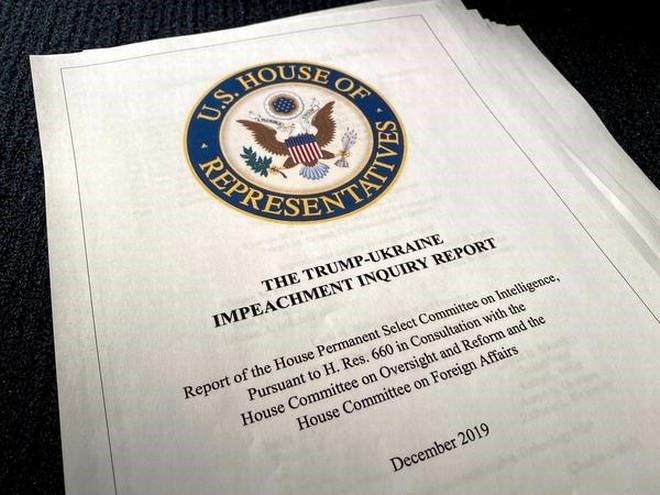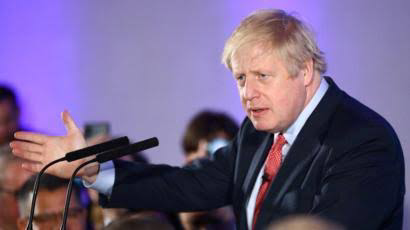The House has released an extensive impeachment report, outlining evidence of what it calls President Donald Trump’s transgression toward Ukraine. The findings will serve as the foundation for debate over whether Trump should be removed from office.
House Intelligence Committee Democrats released a 300-page report outlining their months-long impeachment inquiry into the conduct of President Donald Trump. Based on weeks of dramatic public hearings and additional documents requested from the White House, it’s an indictment of Trump’s pressure on Ukraine and, they say, his threat to the US system of government. We’ve annotated their executive summary and linked to the full report.
The impeachment inquiry into Donald J. Trump, the 45th President of the United States, uncovered a months-long effort by President Trump to use the powers of his office to solicit foreign interference on his behalf in the 2020 election.
As described in this executive summary and the report that follows, President Trump’s scheme subverted U.S. foreign policy toward Ukraine and undermined our national security in favor of two politically motivated investigations that would help his presidential reelection campaign.

The President demanded that the newly-elected Ukrainian president, Volodymyr Zelensky, publicly announce investigations into a political rival that he apparently feared the most, former Vice President Joe Biden, and into a discredited theory that it was Ukraine, not Russia, that interfered in the 2016 presidential election.
Trump has repeatedly said he never personally made a demand. However, Trump did ask for a “favor” right after Zelensky referred to US missile systems during their key phone call — and other officials transmitted to the Ukrainians that the aid was contingent on an investigation. Witnesses in the impeachment inquiry were split. Some said it was a request. Lt. Col. Alexander Vindman testified he believed it was a demand.
To compel the Ukrainian President to do his political bidding, President Trump conditioned two official acts on the public announcement of the investigations: a coveted White House visit and critical U.S. military assistance Ukraine needed to fight its Russian adversary.
During a July 25, 2019, call between President Trump and President Zelensky, President Zelensky expressed gratitude for U.S. military assistance. President Trump immediately responded by asking President Zelensky to “do us a favor though” and openly pressed for Ukraine to investigate former Vice President Biden and the 2016 conspiracy theory.
You can read an annotated transcript of the July 25th phone call. And look at a timeline of all the events that happened on this pivotal day.
In turn, President Zelensky assured President Trump that he would pursue the investigation and reiterated his interest in the White House meeting.
Trump pushed Zelensky to meet with his top cop, US Attorney General William Barr, who was overseeing a review into the origins of the Russia investigation. The President also asked Zelensky to meet with Giuliani, who was pushing both the conspiracy theory that Ukraine was trying to bring down Trump’s campaign in 2016 and the idea that Hunter Biden, Joe Biden’s son, should be investigated. Trump brought up the Bidens during his call with Zelensky. There is no evidence of wrongdoing by either Biden.
Although President Trump’s scheme intentionally bypassed many career personnel, it was undertaken with the knowledge and approval of senior Administration officials, including the President’s Acting Chief of Staff Mick Mulvaney, Secretary of State Mike Pompeo, and Secretary of Energy Rick Perry. In fact, at a press conference weeks after public revelations about the scheme, Mr. Mulvaney publicly acknowledged that the President directly tied the hold on military aid to his desire to get Ukraine to conduct a political investigation, telling Americans to “get over it.”
President Trump and his senior officials may see nothing wrong with using the power of the Office of the President to pressure a foreign country to help the President’s reelection campaign. Indeed, President Trump continues to encourage Ukraine and other foreign countries to engage in the same kind of election interference today. However, the Founding Fathers prescribed a remedy for a chief executive who places his personal interests above those of the country: impeachment.
There are actually two remedies. There’s impeachment, whereby Congress removes an official who betrays the public trust. There are also elections, which happen every four years. We have one coming up in 2020.
Accordingly, as part of the House of Representatives’ impeachment inquiry, the Permanent Select Committee on Intelligence, in coordination with the Committees on Oversight and Reform and Foreign Affairs, were compelled to undertake a serious, sober, and expeditious investigation into whether the President’s misconduct warrants that remedy.
House Speaker Nancy Pelosi officially announced the impeachment inquiry on September 24, the day before the White House released its transcript of Trump’s call with Zelensky.
In response, President Trump engaged in an unprecedented campaign of obstruction of this impeachment inquiry. Nevertheless, due in large measure to patriotic and courageous public servants who provided the Committees with direct evidence of the President’s actions, the Committees uncovered significant misconduct on the part of the President of the United States.
Impeachment investigators issued subpoenas and sought cooperation from political appointees, but most of them declined to participate. With a few exceptions, it was career professionals at the State Department and on the National Security Council who provided nearly all the evidence. However, the White House and Trump’s Republican allies have not disputed the facts in evidence, but rather have argued they are being misinterpreted.
As required under House Resolution 660, the Intelligence Committee, in consultation with the Committees on Oversight and Reform and Foreign Affairs, has prepared this report to detail the evidence uncovered to date, which will now be transmitted to the Judiciary Committee for its consideration.
The House Judiciary Committee will write up the articles of impeachment and consider them before the full House votes. A simple majority vote in the House would impeach the President. Senators would then hold a trial and consider the evidence and whether it warrants removing the President from office, which requires a two-thirds supermajority.



